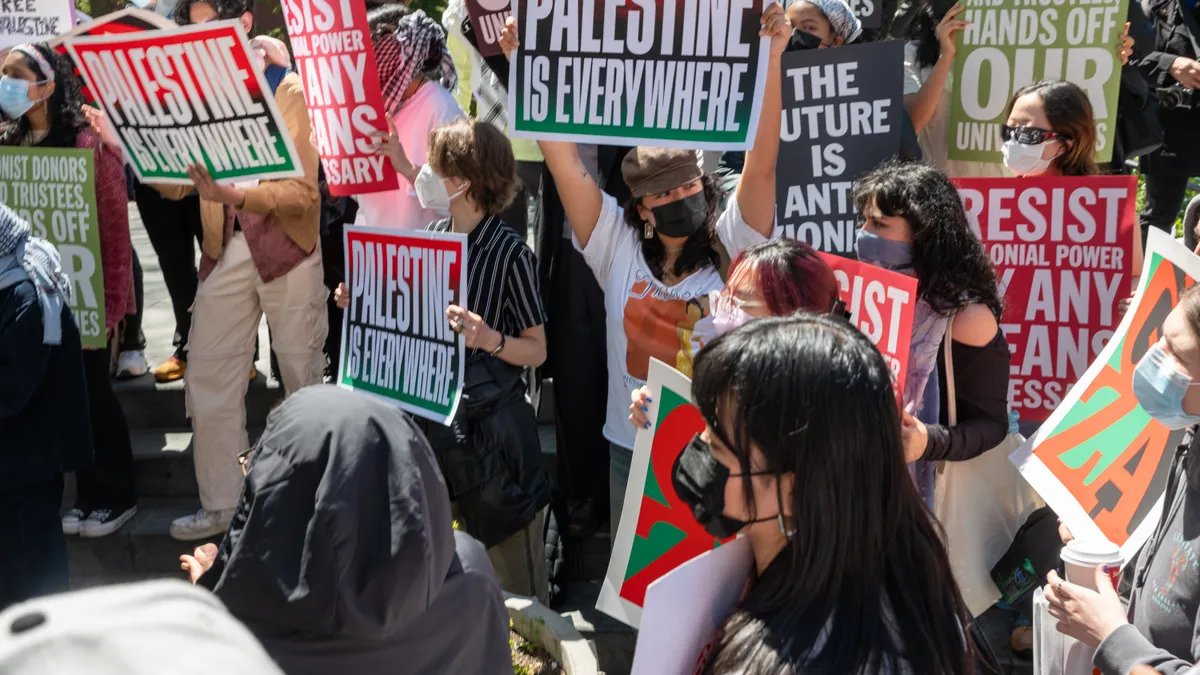As Columbia University continues its struggles to rein in pro-Palestinian protests, similar demonstrations are spreading to other high-profile colleges.
In response to the ongoing Israel-Hamas war, protesters formed an encampment on Columbia's south lawn last week demanding the university divest from companies with ties to Israel. The protests led to reports that some demonstrators were holding signs or chanting phrases that were antisemitic.
The university asked the New York Police Department to disperse the protesters Thursday, leading to over 100 arrests, but the encampment reformed afterward on the other side of the lawn.
Now — after initially scheduling classes to go remote for just one day — Columbia is transitioning to hybrid learning at its main campus for the rest of the semester.
Faculty groups, both at Columbia and other colleges, have criticized the university for both allowing the NYPD onto its private campus and suspending student protesters.
But external pressures have grown.
Sen. Tom Cotton, a Republican from Arkansas, called on President Joe Biden to deploy the National Guard in response to the protests. And billionaire Robert Kraft announced he would pull his philanthropic support from Columbia "until corrective action is taken" to better protect Jewish students.
The tumult at Columbia is far from isolated, as student groups at other colleges are staging similar pro-Palestinian protests and encampments.
The demonstrations come in the wake of the Oct. 7 Hamas attack on Israel that killed about 1,200 people, and the resulting retaliation from Israel in Gaza. The death toll in Gaza has reached at least 34,000, according to the Palestinian Ministry of Health. Hamas, labeled as a terrorist organization by the U.S. government, continues to hold some 130 hostages, Israel Prime Minister Benjamin Netanyahu said Monday.
New York University
Like Columbia, New York University is a private institution, and NYPD officials said the university has traditionally kept officers off of its campus. However, NYU requested police intervention Monday after pro-Palestinian protesters bypassed barriers surrounding Gould Plaza, near the university's business school.
"Our officers responded to the location without delay and dispersed the crowd — making numerous arrests, as necessary," said Kaz Daughtry, deputy operations commissioner at the NYPD, in a Monday statement.
Over 150 students, faculty and people affiliated with Columbia were arrested, according to ABC News. And police maced a member of the Washington Square News, NYU’s student paper, according to multiple reports.
"Today’s events did not need to lead to this outcome," John Beckman, an NYU spokesperson, said Monday. "At one point, we explained to the protesters that they needed to disband in an hour, and there would be no adverse consequences."
Beckman described the protesters as "disorderly, disruptive, and antagonizing."
But the NYU Palestine Solidarity Coalition denied the university's allegations that the protest included "intimidating chants and several antisemitic incidents."
In a Tuesday statement, the group said it could "confidently and affirmatively state that these statements are blatantly false." It also accused the police of using “extreme violence” when making arrests.
A significant number of faculty attended the protest, Daughtry told ABC7. He described the faculty protesters as the most aggressive and resistant toward police.
The group NYU Faculty for Justice in Palestine criticized the university administration for allowing police to "arrest its own students, faculty, staff and anyone who dares to stand in solidarity with Palestine."
Yale University
Yale University had dozens of protesters arrested Monday as its police department broke up a three-day encampment on campus.
Several hundred people — including students and protesters not affiliated with Yale — gathered at the campus's Beinecke Plaza, calling for the university to divest from military weapons manufacturers, Yale said Tuesday.
Prior to Monday's encampment clearing, Yale faculty and staff distributed free speech resources to student protesters, according to university President Peter Salovey.
"The protesters also received repeated notifications that their continued unauthorized use of a campus space was in violation of university policies and state laws and that those who remained would be subject to disciplinary and legal action," Salovey said Tuesday.
But dozens of protesters refused to leave, the university said. Yale's police department ultimately arrested 60 people, including 47 students at the university.
Since then, protesters have regathered off campus, posing what Salovey described as "a safety violation and a disruption to the operation of the City of New Haven."
Harvard University
Harvard University closed the center of its campus to the public following a large-scale pro-Palestinian protest last week.
On Friday, over 200 students and employees rallied in Harvard Yard to push the university to divest from companies and investments in the West Bank, reported The Harvard Crimson, the university's student newspaper.
As of Tuesday afternoon, no arrests had been reported. But Harvard appears to be preparing for more protests, as it keeps Harvard Yard closed to the public this week.
It also suspended the Harvard Undergraduate Palestine Solidarity Committee, one of the student groups leading the protests, for failing to get university approval for Friday's rally, according to The Harvard Crimson, the university’s student newspaper. Harvard had already placed the group on probation earlier this year.
"You can suspend our organization and threaten our students," the group said on social media Monday. "But you will never silence our calls for divestment from apartheid, occupation, and genocide."
The group’s suspension also received pushback from Harvard students unaffiliated with the group.
Nonetheless, the university's response to protests could still escalate.
In an interview with The Crimson, Harvard Interim President Alan Garber did not rule out using police to respond to future student protests.
Harvard was one of the first universities to experience donor backlash over its response to Hamas' October attack on Israel.
Shortly after the attack, The Wexner Foundation cut ties with the university over accusations that it failed to take a “clear and unequivocal stand against” the attack.
The nonprofit, which offers professional development for Jewish people in North America and Israel, had partnered with Harvard for 34 years.






















